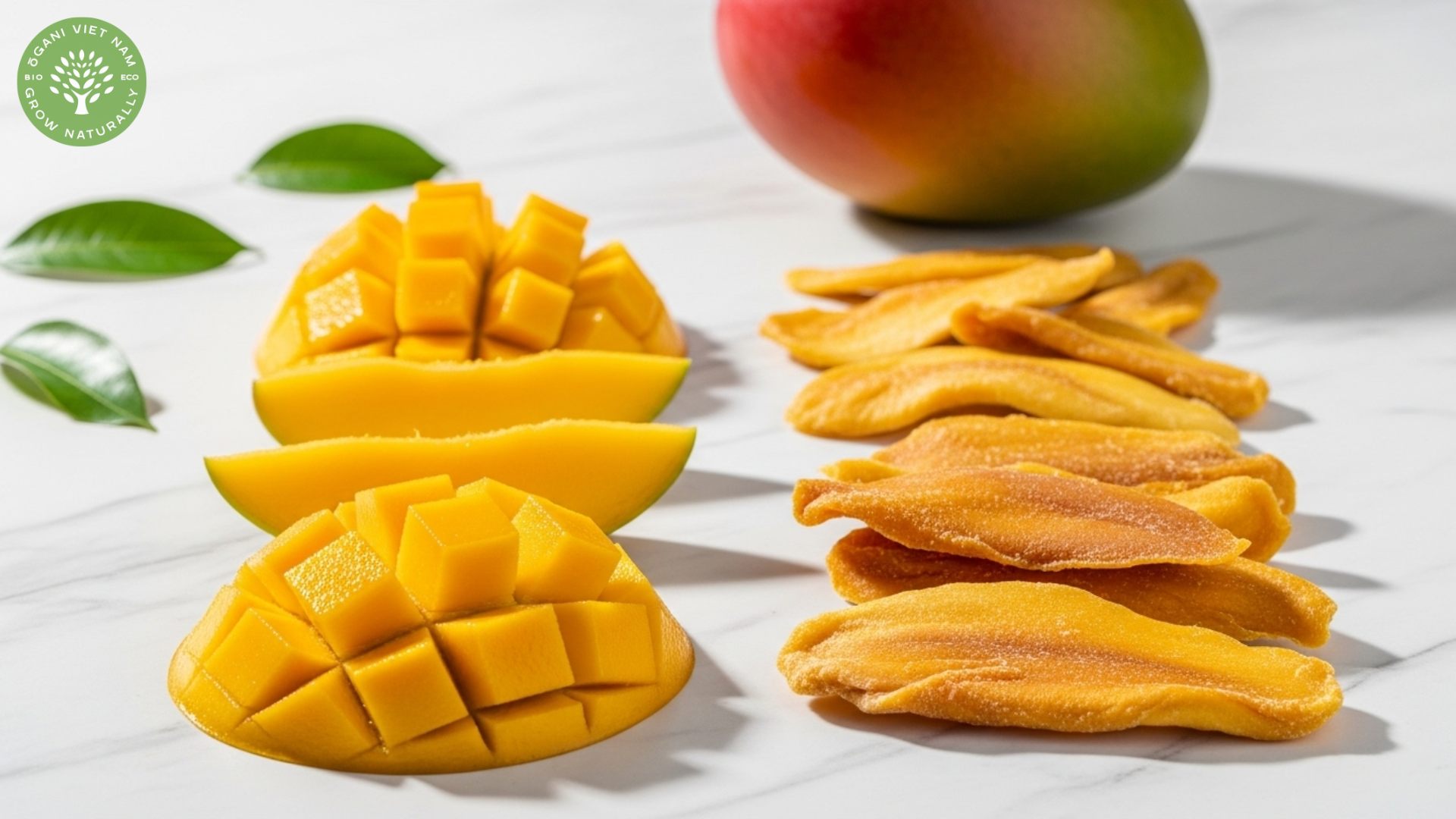When comparing dried mango vs fresh, the key difference lies in water content and nutrient concentration – fresh mangoes provide hydration with fewer calories per serving, while dried mangoes offer concentrated nutrients and portability but with significantly higher sugar content per bite. At Ogani VN, we’ve spent years working with both forms of this tropical treasure, and we’re here to help you make the best choice for your lifestyle and health goals.
Dried mango vs fresh: Complete nutritional comparison
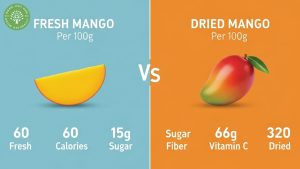
Understanding the nutritional differences between dried mango vs fresh starts with recognizing how the dehydration process transforms this beloved fruit. When we remove moisture from fresh mangoes, we’re essentially concentrating everything – both the good and the concerning aspects.
Fresh mango (100g serving) typically contains about 60 calories, 15g of sugar, and provides roughly 36mg of vitamin C. In contrast, the same weight of dried mango packs approximately 320 calories and 66g of sugar – that’s more than five times the caloric density! However, it’s not all bad news. The drying process also concentrates beneficial nutrients like fiber, vitamin A, and certain minerals.
The portion size difference is crucial here. A standard serving of fresh mango is about 80g, while dried fruit portions should be limited to 30g. This helps explain why many people unknowingly overconsume calories when snacking on dried mangoes – it’s simply easier to eat more when the water content isn’t there to fill you up.
Health benefits of dried mango vs fresh varieties
Both forms of mango offer unique advantages, and at Ogani VN, we believe understanding these can help you incorporate them wisely into your diet.
Fresh mango advantages

Fresh mangoes shine when it comes to hydration and satiety. The high water content (about 83%) means you’re getting natural hydration along with your nutrients. Recent studies have shown that fresh mango consumption promotes better satiety responses compared to dried alternatives, meaning you’ll feel fuller for longer after eating the same caloric amount.
The vitamin C content in fresh mangoes remains intact and bioavailable. This powerful antioxidant supports immune function and helps your body absorb iron from plant-based foods. Fresh mangoes also contain enzymes that aid digestion, which can be particularly beneficial when eaten after meals.
Dried mango benefits
Despite the higher sugar concentration, dried mangoes aren’t without merit. Their portability and extended shelf life make them practical for busy lifestyles. The concentrated fiber content can support digestive health when consumed in moderation. Plus, the chewy texture provides a satisfying snack experience that can help curb cravings for less healthy alternatives.
The drying process preserves certain phytochemicals and antioxidants, though at different potencies than fresh fruit. Some minerals like iron and potassium become more concentrated, offering nutritional benefits in smaller portions.
Blood sugar impact: Dried mango vs fresh responses
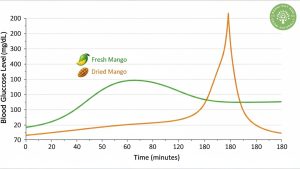
One of the most significant differences in the dried mango vs fresh debate involves blood sugar response. Fresh mangoes, with their natural water content and fiber matrix intact, provide a more gradual release of sugars into your bloodstream. This slower absorption helps prevent sharp glucose spikes and crashes.
Dried mangoes, being more calorie-dense and sugar-concentrated, can cause more rapid blood sugar elevation. For individuals managing diabetes or watching their glycemic response, fresh mangoes are generally the better choice. However, pairing dried mango with protein or healthy fats can help moderate the glycemic impact.
The satiety factor also plays a crucial role here. Fresh mangoes’ high water content triggers stretch receptors in your stomach, signaling fullness more effectively than the same calories from dried fruit. This natural portion control mechanism helps prevent overconsumption and supports better weight management.
Storage and practical uses: Dried mango vs fresh options

When it comes to practical applications, both forms have their place in a well-stocked pantry. Fresh mangoes require careful storage – they ripen quickly at room temperature and last only 5-7 days once ripe. The short shelf life means planning your purchases around consumption.
Dried mangoes offer convenience that fresh fruit can’t match. With proper storage in an airtight container, they can last 6-12 months. This extended shelf life makes them ideal for:
- Emergency snacks during travel
- Trail mix ingredients
- Baking and cooking applications
- Long-term food storage
However, fresh mangoes provide versatility in the kitchen that dried versions can’t replicate. From smoothies to salsas, salads to desserts, the juicy texture and bright flavor of fresh mango enhance countless dishes. At Ogani VN, we’ve found that customers who keep both forms on hand enjoy the greatest flexibility in their meal planning.
Making the smart choice between dried mango vs fresh
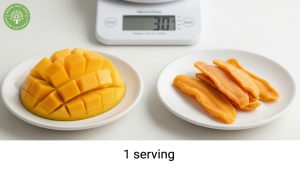
The choice between dried mango vs fresh ultimately depends on your specific needs and health goals. For everyday consumption and optimal nutrition, fresh mangoes win hands down. They provide better hydration, superior satiety, and more controlled sugar intake. The natural portion control and lower calorie density make them ideal for weight management and blood sugar control.
Dried mangoes serve best as occasional treats or convenient travel snacks. When you do choose dried versions, remember these guidelines: stick to small portions (about 30g), pair with protein or nuts to balance blood sugar, and avoid varieties with added sugars or preservatives.
At Ogani VN, we recommend viewing dried mangoes as a concentrated supplement rather than a fruit replacement. Think of them like nature’s candy – enjoyable in moderation but not a substitute for the whole food experience of fresh fruit.
Frequently Asked Questions
Q: Can diabetics eat dried mangoes? A: While not forbidden, dried mangoes should be consumed very sparingly by diabetics due to their concentrated sugar content. Fresh mangoes in controlled portions are a better choice, preferably paired with protein to moderate blood sugar response.
Q: How many dried mango pieces equal one fresh mango? A: Approximately 4-5 pieces of dried mango (30g) equals the calories in half a fresh mango. However, the nutritional profiles differ significantly, so they’re not truly equivalent.
Q: Do dried mangoes have the same vitamins as fresh? A: Some vitamins concentrate during drying (like vitamin A), while others decrease (particularly vitamin C). The mineral content generally becomes more concentrated, but the overall nutritional value per calorie is lower in dried versions.
Q: Which is better for weight loss – dried or fresh mango? A: Fresh mangoes are significantly better for weight loss due to lower calorie density, higher water content, and superior satiety effects. The natural portion control from fresh fruit helps prevent overconsumption.
Your next step with Ogani VN’s premium mangoes
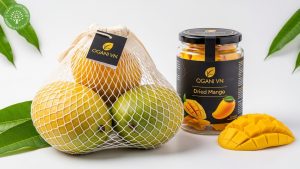
Whether you choose dried mango vs fresh, quality matters most. At Ogani VN, we source only the finest mangoes at peak ripeness, ensuring maximum flavor and nutrition in every bite. Our fresh mangoes are hand-selected for perfect ripeness, while our dried varieties undergo careful processing to preserve nutrients without added sugars.
Ready to experience the difference quality makes? Visit our store to explore our selection of premium fresh mangoes delivered at peak ripeness, or try our naturally dried mango slices for convenient, healthy snacking. Contact our nutrition team for personalized advice on incorporating mangoes into your healthy lifestyle – we’re here to help you make choices that support your wellness journey.
Read more:
- Is Organic Dried Mango Good For You? Health Benefits Revealed
- Best Dried Mango No Sugar Added: Premium Quality Guide
- Calories In Dried Mango No Sugar Added: Complete Nutrition Guide
- Are Dried Mangoes Good For You? The Complete Health Guide
- Dried Mango vs Fresh: Which is Better for Your Health?


